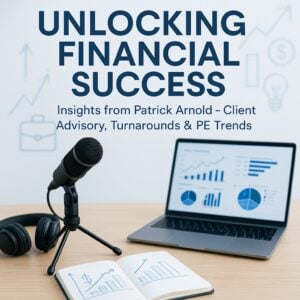Tiffany Vogel didn’t follow the standard path of a fractional CFO. After cut her teeth in healthcare finance and analytics, she took a risk most would balk at: borrowing capital to build her team from day one. Instead of struggling alone, she brought on support staff immediately – leveraging specialized talent to deliver a broader suite of services. That bold move:
- Accelerated revenue by enabling Tiffany to serve multiple clients simultaneously
- Positioned her firm for rapid growth and an eventual exit strategy
- Demonstrated value to prospective clients from day one
Her background in data-driven healthcare forecasting and real-estate investing gave her the confidence – and the discipline—to manage that debt responsibly, turning what many see as a liability into a growth engine.
Funding Growth with Debt: A Counterintuitive Advantage
Most solo CFOs shy away from debt, preferring to bootstrap. Tiffany argues that strategically managed debt can be a catalyst for expansion when interest rates are low and the ROI on hiring is high. Key takeaways:
- Calculate your runway: Only borrow what you can service with projected client fees.
- Invest in talent early: Hiring an assistant or junior analyst can double – or triple – your capacity.
- Monitor cash flow: Aggressive growth must be paired with rigorous forecasting to avoid surprises.
By treating debt as “growth capital” rather than “last-resort funding,” Tiffany unlocked the ability to scale her firm faster than traditional bootstrapped competitors.
Building Boundaries to Prevent Burnout
With rapid growth comes the risk of burnout. Tiffany is candid about the importance of establishing firm boundaries:
- Define “on” and “off” hours: Protect personal time to recharge.
- Automate routine tasks: Use workflows and dashboards to minimize manual work.
- Delegate decisively: Trust your team with client communications and reporting.
As Tiffany puts it, “You can’t serve your clients well if you’re running on empty.” By prioritizing energy management, she ensured her leadership remained sustainable – even at peak growth.
Planning for Exit: The Final Frontier
Even as she builds, Tiffany is already mapping her exit. She’s structuring contracts, documenting processes, and cultivating leadership within her team so the firm can thrive without her at the helm. Every CFO – fractional or full-time – should:
- Start with the end in mind: Identify your ideal exit timeline and valuation targets.
- Document repeatable systems: Ensure clients and staff know exactly how you deliver results.
- Develop internal leadership: Empower your senior analysts to make strategic decisions.
This “build-to-sell” mindset not only maximizes your firm’s value, but also frees you to pursue new challenges – or simply step away on your own terms.
Ready to Transform Your CFO Practice?
Whether you’re just starting out or looking to supercharge your existing firm, Tiffany’s three-year plan offers a proven roadmap. Listen to the full conversation to hear her real-world examples, candid reflections on risk and resilience, and why she’s launching founder retreats designed to catalyze transformational growth.




